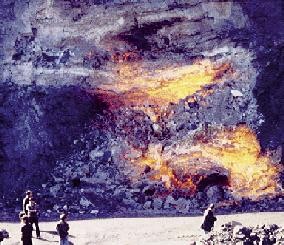China:
We cannot provide enough energy for our huge population and growing economy without using fossil fuels like our coal resources. How can we reduce the environmental damage?
Norway:
Carbon storage systems can be efficient for large power plants. We have developed storage systems and we ___________ ___________(cooperate) in order to build up such systems in China.
|
 |
 |
 |
|
7. Coal is not only the dirtiest fossil fuel with respectiv to burning efficiency. Often, additional CO2 is released after exploitation by smoldering coal fires under the ground. Source: EARS project.
|
|







